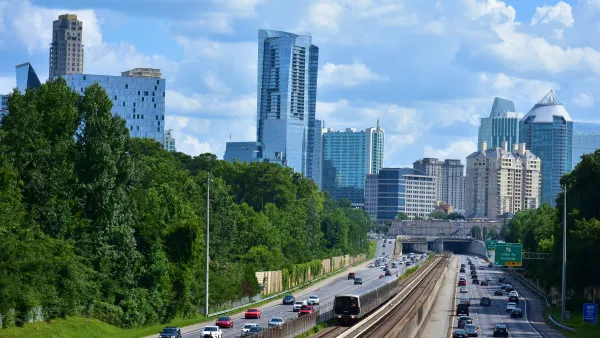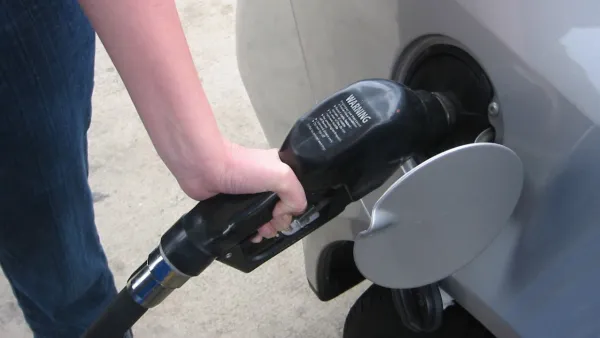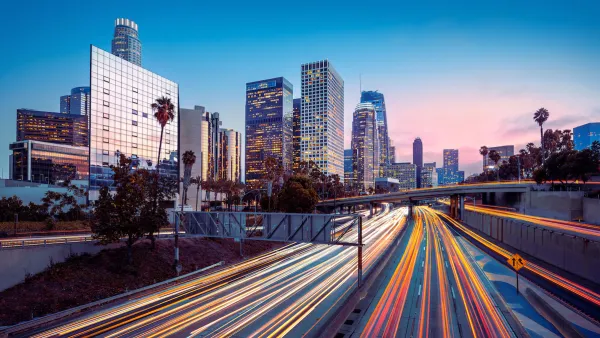In this op-ed, MIT climate research scientist Valerie J. Karplus contrasts raising CAFE standards with gas taxes. While the former may be more politically expedient, she shows how it is less effective in reducing emissions, oil reliance and driving.
While raising Corporate Average Fuel Economy (CAFE) standards may be more politically expedient, it is far less effective than increasing gas prices in reducing climate emissions, air pollution, and reliance on imported oil, according to Dr. Karplus. She also makes the case that the administration's new "54.5 MPG by 2025" regulation "will have no effect on the 230 million passenger vehicles on the road now".
While higher gas taxes can reduce driving for all vehicles on the road, increased fuel efficiency does just the opposite - known as the rebound effect or Jevon's Paradox.
But what abut the regressivity of high gas taxes? "(T)he gasoline tax is a tool of energy and transportation policy, not social policy, like the minimum wage", asserts Karplus.
How much more effective are higher gas taxes than higher CAFE standards in reducing fuel consumption and emissions?
In a paper published online this week in the journal Energy Economics, I and other scientists at the Massachusetts Institute of Technology estimate that the new standards will cost the economy on the whole — for the same reduction in gas use — at least six times more than a federal gas tax of roughly 45 cents per dollar of gasoline. That is because a gas tax provides immediate, direct incentives for drivers to reduce gasoline use, while the efficiency standards must squeeze the reduction out of new vehicles only.
Not stated in the op-ed is the "The Collision Course of Fuel Efficiency Standards and Transportation Revenue" for the Highway Trust Fund.
The report, also summarized in MIT News: "The case of the missing gas tax", will hopefully add to the political dialog on the importance of raising gas taxes on top of the need to fully fund the Highway Trust Fund that under MAP-21 transportation reauthorization is now reliant on $18.8 Billion from the general fund according to the Congressional Budget Office (PDF).
The climate scientist states in her closing paragraph, "Increasing the (gas) tax, as part of a bipartisan budget deal, with a clear explanation to the public of its role in lowering oil imports and improving our air and highways, could be among the most important energy decisions we make."
One can't but wonder in today's polarizing politics how likely a bipartisan budget deal is on any issue, least of all a tax that many political scientists have concluded may be impossible to increase. In such a climate, is increasing CAFE standards better than doing nothing?
Dr. Karplus is the China Energy and Climate Project Director in MIT's Joint Program on the Science and Policy of Global Change.
FULL STORY: The Case for a Higher Gasoline Tax

National Parks Layoffs Will Cause Communities to Lose Billions
Thousands of essential park workers were laid off this week, just before the busy spring break season.

Retro-silient?: America’s First “Eco-burb,” The Woodlands Turns 50
A master-planned community north of Houston offers lessons on green infrastructure and resilient design, but falls short of its founder’s lofty affordability and walkability goals.

Delivering for America Plan Will Downgrade Mail Service in at Least 49.5 Percent of Zip Codes
Republican and Democrat lawmakers criticize the plan for its disproportionate negative impact on rural communities.

Test News Post 1
This is a summary

Test News Headline 46
Test for the image on the front page.

Balancing Bombs and Butterflies: How the National Guard Protects a Rare Species
The National Guard at Fort Indiantown Gap uses GIS technology and land management strategies to balance military training with conservation efforts, ensuring the survival of the rare eastern regal fritillary butterfly.
Urban Design for Planners 1: Software Tools
This six-course series explores essential urban design concepts using open source software and equips planners with the tools they need to participate fully in the urban design process.
Planning for Universal Design
Learn the tools for implementing Universal Design in planning regulations.
EMC Planning Group, Inc.
Planetizen
Planetizen
Mpact (formerly Rail~Volution)
Great Falls Development Authority, Inc.
HUDs Office of Policy Development and Research
NYU Wagner Graduate School of Public Service





























